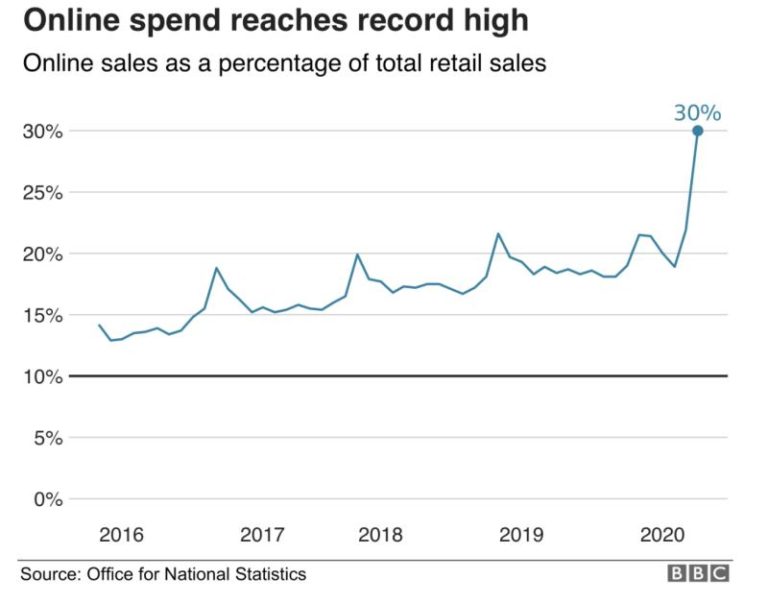The Home & Garden industry usually sees their Peak sales on Easter weekend and the summer Bank Holidays, this year the industry has experienced a sales surge above and beyond normal peak with sustained growth happening across the months of lockdown. Since March 2020, Scurri has seen a 262% increase in online Home & Garden sales.
However, not all retailers were ready to meet this surge in demand. This week the Scurri blog looks at the trends, challenges and learnings for retailers from the companies that thrived during the pandemic and how to move forward in this new era.

The seismic shift to eCommerce.
Online shopping was already a rising trend but the Covid-19 health crisis has unexpectedly propelled it forward in a short space of time. eCommerce is now at an all-time high as consumer behaviour was forced to change amidst the pandemic.
According to the (consumer confidence tracker), the amount of people who have reduced or stopped their visits to physical stores is 89%. For the first time ever online sales are running at 30% of total retail sales (source) and the evidence suggests that people will continue their new online shopping habits, post lockdown.
43% say they will continue to shop in this new way after the pandemic, it remains to be seen exactly what that figure will be in reality but it is certain that things will never be the same again so ecommerce capabilities are vital for survival.


+41% of shoppers have received a Home & Garden parcel during Covid-19.
Royal Mail
Trends & growth in online Home & Garden sales.
The notion that one’s home as one’s castle set in as shoppers were confined to their homes during quarantine. Naturally, their attention turned towards improving their own environment, home décor improvements, gardening and DIY projects came to the fore.
IMRG revealed in a recent webinar focusing on the sector that YoY sales growth for the Home & Garden category is 83.16% as of May 01.
Business is undeniably blooming for the Home & Garden with April 2020 being the biggest on record for many. 63% MoM sales growth for April according to IMRG.
This unexpected surge in sales brought a wave of challenges to retailers involved and it was the ones with the slickest eCommerce operations who managed to adapt to the rise in demand and continue business during store closures and lockdown measures.
Winners and losers.
Not everyone was prepared for this rapid boom, the companies without a solid eCommerce strategy were caught off guard and are playing catch up. The opportunities presented could only be seized by retailers that knew how to digitise their business.
For the visionary retailers that were already online, the biggest challenge was the colossal and unanticipated increase in orders. They were presented with the challenge of delivering more than ever before, rapidly expanding their capacity to fulfil orders and managing customer expectations. More about how they overcame these challenges below.
For the retailers that only had a small online presence compared to their physical stores, they also saw a jump in orders but had the additional headaches of putting new systems in place at an accelerated pace and requesting to be accepted by carriers as new customers which was not always an option during the crisis.
For the more reluctant retailers that were forced to move online for the first time, their challenges were in finding a solution quickly to set up online and fulfil deliveries using manual processes and again trying to be accepted by carriers as new customers

Smart solutions from forward thinking retailers.
The retailers that continued selling without interruption during the crisis were the ones that already had systems established that allowed them to adapt quickly to a rapidly changing situation.
Scurri customers still had major challenges keeping up with the demand but having Scurri in place gave them the ability to expand their delivery capacity quickly.
Expanding Capacity and having contingency.
Having access to a carrier network meant retailers had their basis covered not only to compensate for when drivers were unavailable due to illness but to meet the increased orders by expanding capacity quickly. The flexibility and contingency by being able to add new carriers in a crisis would otherwise be impossible without a first-class carrier management system like Scurri in place.
Always have a Plan B to ensure you can expand delivery capacity at the drop of a hat.
We also saw Scurri customers use their closed stores as fulfilment centres as they adopted the Shipping from Store method. This allowed them to double or even triple fulfilment as they expanded using these additional ‘warehouses’.
Retailers that weren’t online before the crisis saw their warehouses being swallowed up by their forward-thinking competitors to expand their fulfilment. A prime example of how you can miss out by not being prepared, having contingency is crucial.
Adding additional backbenches, warehouses and even carriers is a cinch with Scurri.
Managing customer expectations – Communicate!
Customers do not expect next day delivery during the crisis but they do still want to know about their order. The retailers that were upfront about delivery times and delays at the point of order and made use of Tracking data to keep their customers informed across the entire customer journey not only earned the trust of the shopper but reduced the amount of ‘where’s my order’ and customer service enquires that also surged along with increased orders.
Scurri is built to be extremely easy to scale quickly and we saw this happen with Home & Garden during lockdown with our customers being adaptable and flexible enough to meet increased demand.

Moving forward.
Ecommerce has accelerated a decade in the space of one quarter in the minds of the consumer, it’s evolving fast but it still has a long way to go. There is huge growth opportunity for retailers that are ready to adapt.
Embracing retail technology and taking advantage of innovative solutions available is essential to position your business for success, whether it’s during a crisis or not.
Shoppers were merciful during the height of the crisis but this forgiving attitude to delays will abate over time. Customer expectations will be heightened and the customer experience will become more crucial than ever as a key differentiator.
Communication is key as offerings evolve, retailers that don’t communicate delivery delays or offer tracking status updates will lose out to the ones that do.
Delivery connects you to your customers. Brands that can deliver despite unfavourable circumstances and meet customer needs during peak demand will retain customers, shoppers value trust and reliability above speed of delivery.
Retailers must deliver a seamless experience to succeed beyond this crisis.
Sources: Internet Retailing, IMRG, Essential Retail, Royal Mail.

AUTHOR
Laura Roche Marketing Executive, Scurri
Laura Roche is a Marketing Executive at Scurri, managing social media and content marketing. Laura shares breaking news in the eCommerce space with our readers as well as sharing insights across the delivery and logistics landscape.
